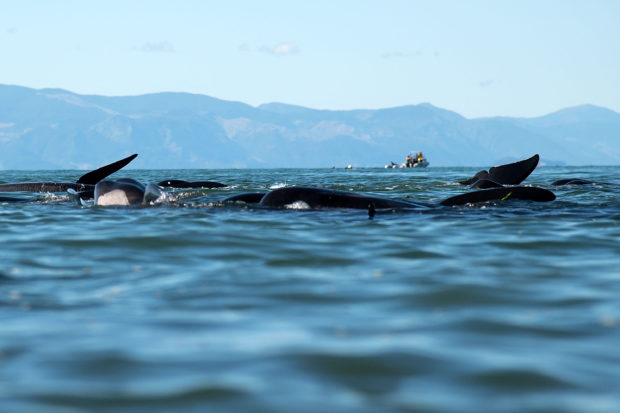Joy as whales refloated at notorious New Zealand stranding spot

The rescued pilot whales gather together after being refloated during a mass stranding at Farewell Spit on February 11, 2017. – More than 400 whales were stranded on a New Zealand beach on February 10, with most of them dying quickly as frustrated volunteers desperately raced to save the survivors. (Photo by Marty MELVILLE / AFP)
WELLINGTON — A group of 28 pilot whales were successfully refloated at a notorious New Zealand beach where more than a dozen of the marine mammals died this week, jubilant rescuers said Wednesday.
The long-finned pilot whales, which had re-stranded themselves once before, appeared to have finally swum out to sea, animal rescue charity Project Jonah said.
“The live whales haven’t stranded overnight, so it’s looking like success right now. We’re using the phrase ‘cautiously optimistic’,” the charity’s general manager Daren Grover said.
The whales were part of a pod of around 50 found Monday at Farewell Spit, about 90 kilometers (55 miles) north of the South Island tourist town of Nelson.
Some 40 whales were pushed out to sea on Monday evening but swam back ashore by the next morning, with around 60 volunteers moving the 28 survivors back into the water for a second time.
Article continues after this advertisement“The beaches have been checked all the way along Farewell Spit and there’s no sign of live whales… So far, so good,” Grover said.
Article continues after this advertisementHe said the dead whales would be moved to an area of the beach not used by the public, where the bodies will receive a blessing from the local Maori iwi (tribe).
Farewell Spit, a 26-kilometer hook of sand that protrudes into the sea, has been the scene of at least 10 pilot whale strandings in the past 15 years.
The most recent was in February 2017, when almost 700 of the mammals beached, resulting in 250 deaths.
Scientists are unclear about why the beach is so deadly. One theory is that the spit creates a shallow seabed in the bay that interferes with the whales’ sonar navigation systems.
Pilot whales, the most common species of whale in New Zealand waters, are particularly susceptible to mass strandings.
The whales, which grow up to six meters (20 feet) long, are regularly found beached in large numbers.
They were involved in New Zealand’s largest recorded mass stranding at the Chatham Islands in 1918, when a pod of 1,000 swam ashore.
The remote islands, about 800 kilometers (500 miles) east of the South Island, was the scene of another incident in November last year when almost 100 whales died.
It is thought that the highly sociable animals may follow a sick leader ashore, become panicked by predators or stressed in extreme weather.